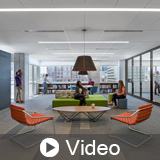
Enlightened Spaces: Harnessing Natural Light with Glass Operable Wall Systems
As an industry leader in the moveable wall concept, Modernfold delivers the highest-quality, custom wall solutions from start to finish. Our operable partitions and architecturally-striking glass wall systems wow customers and provide them with endless possibilities for their environments. Where others see only space, Modernfold sees possibilities.
Glass operable wall systems offer a multitude of benefits including adaptability, daylighting, energy savings, sustainability, and occupant well-being. These systems optimize the entry of natural light, creating well-lit spaces that positively impact employee well-being, productivity, and satisfaction. This not only reduces energy consumption but also aligns with sustainable design practices. The adaptability of glass wall systems allows for flexible space configurations, accommodating changing needs and promoting a dynamic work environment. Glass wall systems can contribute to LEED v4.1 BD+C and ID+C projects and offer a holistic approach to sustainable design by enhancing adaptability, maximizing daylighting, promoting energy savings, and providing noise reduction benefits, all while contributing to a cost-effective and aesthetically pleasing space for occupants.
- Discuss how glass operable wall systems can contribute to sustainability, daylighting, energy savings, noise reduction, occupant well-being, and LEED v4.1 BD+C and ID+C systems
- Compare and contrast glass wall systems and their benefits related to acoustics, adaptability, privacy, egress options, occupant control, and LEED v4.1 BD+C and ID+C strategies
- Describe how glass wall systems can contribute to LEED v4.1 BD+C and ID+C credits and foster healthy building materials, thermal comfort, daylighting, acoustics, and occupant health
- Review glass wall system case studies that demonstrate cost-effective and sustainable solutions for multiple applications in various environments





